
McKinley County is a county in the northwestern section of the U.S. state of New Mexico. As of the 2020 United States Census, its population was 72,902. Its county seat is Gallup. The county was created in 1901 and named for President William McKinley. McKinley County is Gallup's micropolitan statistical area.
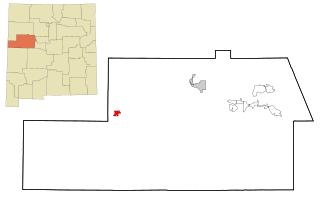
Pinehill or Pine Hill is a census-designated place in Cibola County, New Mexico, United States. It is located on the Ramah Navajo Indian Reservation. The population was 88 at the 2010 census. The location of the CDP in 2010 had become the location of the Mountain View CDP as of the 2020 census, while a new CDP named "Pinehill" was listed 8 miles (13 km) further south, at a point 4 miles (6 km) southeast of Candy Kitchen.

Gallup is a city in McKinley County, New Mexico, United States, with a population of 21,899 as of the 2020 census. A substantial percentage of its population is Native American, with residents from the Navajo, Hopi, and Zuni tribes. Gallup is the county seat of McKinley County and the most populous city between Flagstaff and Albuquerque, along historic U.S. Route 66.

The Christian Reformed Church in North America is a Protestant Calvinist Christian denomination in the United States and Canada. Having roots in the Dutch Reformed Church of the Netherlands, the Christian Reformed Church was founded by Dutch immigrants in 1857 and is theologically Calvinist.
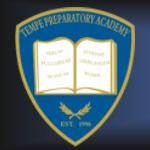
Tempe Preparatory Academy is a public charter school in Tempe, a suburb of Phoenix, Arizona in the United States. Founded in 1996, Tempe Preparatory Academy offers a Great Books, core liberal arts curriculum centered on Western tradition, history, language, and literature. Its motto is Verum, Pulchrum, Bonum, meaning Truth, Beauty, Goodness. It is also the founding model for the Great Hearts Academies schools, with which it is otherwise unaffiliated. Tempe Prep is an independently-governed public charter school. Since 2015, the headmaster has been Wayne Porter. Past headmasters include Thomas Butler, Andrew Zwernaman, Daniel Scoggin, George Lowe, Ron Bergez, Julie Boles, Hugh Hallman, and David Baum.

St. Peter Catholic High School is a Catholic high school located in Orléans, a suburb of Ottawa, Canada. The current principal is Linda Meulenbroek. The school includes grades 7–12. During the 2019–2020 school year, 525 intermediate and 1,235 high-school students were enrolled.
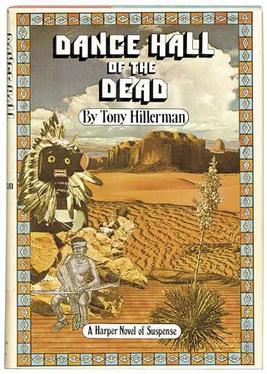
Dance Hall Of The Dead is a crime novel by American writer Tony Hillerman, the second in the Joe Leaphorn/Jim Chee Navajo Tribal Police series, first published in 1973. It features police Lieutenant Joe Leaphorn. It is set primarily in Ramah Reservation and the Zuni village in New Mexico, both in the American Southwest.

The Ramah Navajo Indian Reservation is a non-contiguous section of the Navajo Nation lying in parts of west-central Cibola and southern McKinley counties in New Mexico, United States, just east and southeast of the Zuni Indian Reservation. It has a land area of 230.675 sq mi (597.445 km2), over 95 percent of which is designated as off-reservation trust land. According to the 2000 census, the resident population is 2,167 persons. The Ramah Reservation's land area is less than one percent of the Navajo Nation's total area.
Rezball, short for "reservation ball," is a style of basketball associated with Native Americans, particularly at the high school level in the Southwestern United States, where many of the Indian reservations were created in the country.
Gallup-McKinley County Schools (GMCS) is a school district based in Gallup, New Mexico which serves students from Gallup and surrounding areas of McKinley County.
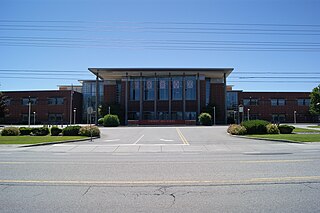
University High School, often referred to as "U-Hi" or "U-High", is a public high school for grades nine through twelve in Spokane Valley, Washington, United States. It is part of the Central Valley School District in Spokane Valley.
Seoul Foreign School is a Pre-K/Reception to Grade 12 international school located in Seoul, South Korea. The school was founded in 1912 by Christian missionaries to Korea and emphasizes Christian values. The Elementary, Middle and High Schools offer an international curriculum within the International Baccalaureate framework of PYP, MYP and DP. The High School offers the IB Diploma Programme. The British School offers the English National Curriculum - Key Stages 1–3. Seoul Foreign School has been located in Yeonhui-dong, Seodaemun-gu, since 1959.

Sioux Falls Christian Schools (SFC) is a private school located in Sioux Falls, South Dakota. The school was founded in 1958 as an elementary school named Calvin Christian. Since its inception, SFC has expanded and currently offers programs from pre-kindergarten to 12th grade and is accredited by the state of South Dakota and Christian Schools International.

Harrison Begay, also known as Haashké yah Níyá was a renowned Diné (Navajo) painter, printmaker, and illustrator. Begay specialized in watercolors, gouache, and silkscreen prints. At the time of his death in 2012, he was the last living, former student of Dorothy Dunn and Geronima C. Montoya at the Santa Fe Indian School. His work has won multiple awards and is exhibited in museums and private collections worldwide and he was among the most famous Diné artists of his generation.
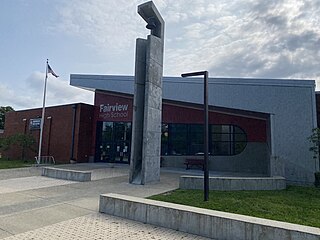
Fairview High School is a public high school in Westwood, Boyd County, Kentucky, United States, a census-designated place closely affiliated with Ashland, Kentucky. It is part of the Fairview Independent Schools.
Lynden High School (LHS) is a public high school in Lynden, Washington, United States. Lynden High School serves students in grades 9-12 for the Lynden School District.

Many Farms Community School, Inc. (MFCS), is a tribally controlled K-8 school in Many Farms, Arizona, operated by the Navajo Nation. It is funded by the Bureau of Indian Education (BIE). MFCS has a boarding program to serve students who live at a distance from this community.
Jim Abeita is a Navajo oil painter from Crownpoint, New Mexico. He is best known for his realistic landscapes and portraits depicting his native people and their history and traditions. He was one of the first Native American artists to work in contemporary realism, painting with depth and shadow instead of in the flat-style traditional Native American art. Abeita is praised as a pioneering artist who modernized the Native American art scene, made it famous in the art market and paved the way for a new generation of artists.
Ramah Middle/High School is a public secondary school in unincorporated McKinley County, New Mexico, near the Ramah census-designated place and with a Ramah postal address. It is a part of Gallup-McKinley County Schools.

















